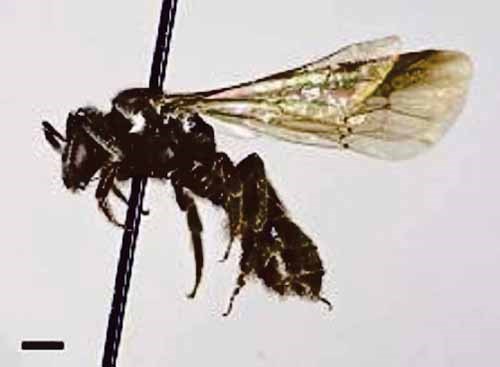A new bee species has been named after Royal Saskatchewan Museum (RSM) Curator of Invertebrate Zoology, Dr. Cory Sheffield.
Mexalictus sheffieldi, from the mountains of Guatemala, is one of 21 new species of Mesoamerican bees described in a paper recently published by Sheila Dumesh from York University. A leading expert on Canadian bees, Sheffield discovered the species while examining a vial of bee specimens collected in 1987 by researchers at the Canadian National Collection.
"Biodiversity surveys often yield a lot of specimens that researchers are not specifically looking for at that time, but are still very valuable to science," Sheffield said. "This really demonstrates the importance of museums like the RSM collecting and storing all insects collected during biodiversity surveys. The material may help researchers from other institutions for years to come."
The single Mexalictus sheffieldi specimen is currently housed at York University where it remains for future study. Sheila Dumesh, a former graduate student at the same university and a former colleague of Sheffield's, decided to name the specimen after its discoverer.
"I chose to name this new bee species in honour of Dr. Cory Sheffield not only because he provided me with the sole specimen, but more importantly for his help and involvement with the project," Dumesh said. "He is a fellow entomologist and a very good friend, so it's a nice gesture."
Since joining the RSM in 2012, Sheffield has shared his knowledge and enthusiasm for bees and other insects through museum displays and unique learning opportunities.
Over the summer, he joined students and fellow scientists participating in the RSM's Bio-Blitz survey. With the hope of discovering new records for the province, and potentially new species, the survey focused on identifying bees and other pollinators found within Saskatchewan. Mexalictus sheffieldi was collected and stored for more than 20 years before its discovery; similarly, the RSM will help preserve specimens collected during the Bio-Blitz for present and future scientific study.
To learn more about Dr. Sheffield and the Bio-Blitz project, visit http://www.royalsaskmuseum.ca/research-collections.




